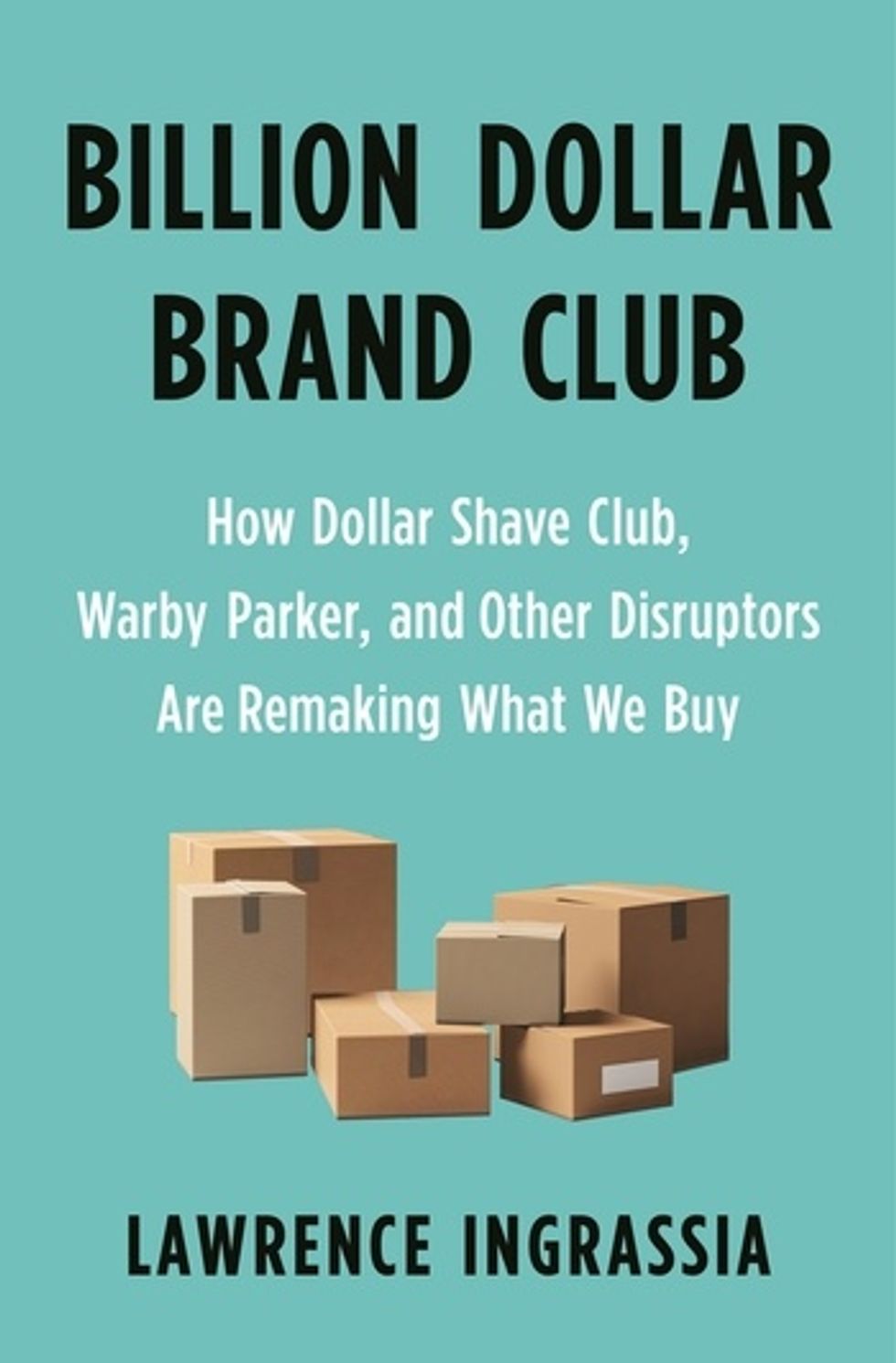How Dollar Shave Club, eSalon Built a 'Billion Dollar Brand'
Lawrence Ingrassia is an award-wining journalist and the author of " Billion Dollar Brand Club."

- Relying on analytics, the founders of eSalon who knew nothing about hair dye, built a trendsetting personalized hair color brand that did $30 million in sales
- The e-commerce brand uses individual data, machine-learning algorithms and predictive analytics to create formulas that keeps customers coming back
- The Takeaway: Retail is being upended by direct-to-consumer companies that can acquire key metrics to customize products and retain shoppers
In recent years, you no doubt have seen a growing number of new brands pop up everywhere you go online – and you've probably bought some. Where did they come from? Who are the entrepreneurs behind them? Why did they think they could take on long-dominant brands?
This is an excerpt from " Billion Dollar Brand Club," authored by award-wining journalist Lawrence Ingrassia and published on January 28 by Henry Holt and Company.
The book explores how an unlikely band of entrepreneurs launched a business revolution in the way new brands are created and sold online. One of the most successful direct-to-consumer brands, Dollar Shave Club, was founded in Los Angeles and got its initial seed funding from Science Inc. in Santa Monica. This excerpt from Chapter 6, "The Algorithm is Always Right," tells the story behind eSalon, based in El Segundo, and how it tapped data analytics to create customized hair coloring.
The customer, a woman in her mid-to-late forties, knows what she wants when she logs onto eSalon.com to order its customized hair coloring for the first time: dye to match her natural blonde color – and cover up her grays – with the lightest blonde shade it offers. As she clicks through a series of about a dozen questions, the algorithm inside eSalon's computers starts churning away. Without anyone from the company having met or even talked to her, it will understand her hair coloring better than she does by the time she finishes answering the questionnaire.
How long is your hair? it asks. How much gray do you have? How straight or curly is your hair? How thick is your hair? What is your ethnicity? What color are your eyes? What is your natural hair color? What is the closest shade to your natural color? Would you like to maintain your current color?
To help her, the questionnaire shows thirty-one photos of different shades of blonde, with very small gradations from lighter to darker colors. At the end, she selects the lightest blonde color eSalon offers, just as she intended. But that's not exactly what she will receive.
eSalon has collected data from more than five million people. Based on this woman's answers, it knows the best color formulation to achieve the blonde look she wants, regardless of what she thinks. eSalon's computers have learned from crunching the data that many first-time customers who fit her profile and order the lightest blonde dye have been disappointed; they felt their hair came out looking too blonde – too "hot" in hair coloring jargon. The numbers show that eSalon has a higher reorder rate from customers who asked for a slightly darker color for their next order, so that their hair wouldn't come out looking quite so light.
Knowing all of this, eSalon automatically sends the customer – without telling her – a formulation that has 98 percent of its lightest blonde share with 2 percent blue added to soften the color, or cool it, rather than 100 percent blonde. "After seeing this data, we adjusted our algorithm so that new customers who are a natural pure blonde and want to keep that look automatically get that little bit of blue added," explains Tom MacNeil, eSalon's chief technology officer. "They're happier with the result, even though they're asking for the blondest of blonde that we have."
For eSalon, and almost all direct-to-consumer brands, data is the coin of the realm. The data they collect directly from each customer provides a significant advantage over bigger, long-established brands. Clairol doesn't have this data, because the customers they deal with directly are retailers. The people who use the product are largely anonymous to Clairol; they walk into a drugstore, pick a box of hair coloring off the shelf, pay for it, and walk out.
eSalon's shelf is its website, and it collects information about each customer who walks through its digital door and answers its questionnaire. The longer a woman remains a customer, the more eSalon knows about her – and not just her. eSalon aggregates all of that individual data and uses machine-learning algorithms and predictive analysis to inform virtually everything it does: from adjusting its product formulations to introducing new products (like color for highlighting hair) to testing seemingly insignificant word changes on its web pages. "In the end, we're a tech company selling a beauty product," says Tamim Mourad, one of eSalon's co-founders.
Data mining is critical to the biggest challenges facing all direct-to-consumer brands: holding down the cost of attracting customers and keeping them after a purchase or two. Using the data it has gathered, eSalon has improved its retention rate from below 50 percent to about 70 percent on its customers' initial orders. One of the key metrics, especially for subscription companies, like eSalon, Dollar Shave Club, and Hubble, is a customer's lifetime value, or how much she will spend over time. The cost of acquiring customers can be offset only if a lot of them become repeat customers who buy month after month or, even better, year after year. "It's all about retention, because nobody makes money on the first order," explains Francisco Gimenez, another co-founder.
Businesses have used predictive analytics for the past couple of decades, but the growing power of computers, along with the ability of online brands to gather huge amounts of data, has made machine learning central to their success.
Tamim Mourad and several of his colleagues at eSalon discovered from experience the importance of technology to a startup. In 1998, before the direct-to-consumer brand revolution began (indeed, before many of the entrepreneurs behind many of these startups had graduated from college or even high school), they started an internet company, while they were in their twenties. The company, PriceGrabber, was one of the original online price comparison sites. In 2005, Experian bought the company for $485 million – yielding a huge gain on the founders' total investment of $1.5 million.
After taking a couple of years off, the PriceGrabber founders began brainstorming about starting another business.
In the fall of 2008, Mourad and his wife were having dinner with a couple who owned a beauty salon in Beverly Hills. The other woman, who was a hair colorist, tossed out a business idea. "She said that women who color their hair at home don't do it well, because there is a dearth of information," Mourad says. What about starting a web site that explained how to dye your own hair? He didn't see a way to make money from that. But he asked her, "Is it possible to formulate color for someone sight unseen, and mail them something they apply at home? If that works well, then you're delivering a product that is better than the standard hair coloring in a box at drugstore, that would approximate what someone could get at a hair salon. If you could do that, you could charge a price that was a premium. There's a business model."
He went back to his former PriceGrabber colleagues, all men who knew nothing about hair coloring. But the more they thought about the idea, the more they liked it.
It was a business ready for disruption, they decided. Off-the-shelf packaged brands were fine, but most offered only around fifty pre-mixed shades. "Many people who color their own hair at home in general are not happy, because the results are mixed," Francisco Gimenez notes. "But it is affordable, which is why they do it. At the high end, salons charge on average around $60 for base color, though it can go as low as $45 in some cities and is more like $100 or $150 in bigger metro areas."
The PriceGrabber guys concluded there could be an opening for a new brand priced about $25. In today's global marketplace, it would be easy to find suppliers to sell them professional-grade ingredients that go into hair coloring formulations – dyes, modifiers (to stabilize color tones), vitamins (to moisturize the hair), antioxidants, hydrogen peroxide (to remove the old color and activate the new dye), among others. The biggest challenge would be to figure out how to combine all these ingredients to mimic what a stylist does in customizing color for each woman who comes into a salon. "Can you formulate hair coloring for someone sight unseen?" Mourad says. "We had to figure out how to test that idea."
They first did a proof-of-concept test to see if women might be interested in buying customized color online. They created a rudimentary web site and then hand-mixed colors for about fifty women who had signed up, submitted a photo, and said what color they wanted. Then the women were asked if they liked the color better than the results they got with a do-it-yourself kit at a drug store. "We recruited people who were willing to put this product on their hair, with no idea who we really are. The results were positive enough for us to say we have something," he recalls.
The next step: tapping their knowledge of tech and data science to figure out how to replicate color customization on sale, for fifty thousand women, not just fifty. "We wanted to do something that was really innovative, not bullshit innovative," Mourad says.
Omar Mourad, Tamim's younger brother and another of PriceGrabber's co-founders, read everything he could about dyeing hair. "I didn't have any tangible color experience applying it on any person's hair. But I became a theoretical expert," Omar says.
Over the next several months, he and Gimenez took the lead in translating the rules of hair coloring into software that would determine the right customized mix to get the desired color. That can depend on a numerous variables: a woman's natural color, her current dyed color, how recently she dyed her hair, how much gray hair needs to be covered up, the texture and length of her hair. "You basically look at all of the combinations, and then build out a matrix for how to formulate," Omar explains. Using that knowledge, the team developed a questionnaire that included queries a stylist would ask a first-time customer. The questions themselves aren't rocket science. The rocket science happens when hundreds of thousands or millions of people answer the questionnaires, enabling you to gather more and more data to analyze.
The final step was to automate the formulation. In September 2010, the product was launched. As with an apprentice stylist, eSalon's formulations improved over time as the company got more customers and was able to gather more information. As of 2018, eSalon had dispensed 165,000 different formulations. That's out of a total, it calculates, of 2.2 octooctogintillion pigment variations (that would be 22 followed by 266 zeroes).
In 2019, rival L'Oreal introduced a new brand, Color&Co, that copied key features of eSalon, including an online quiz or a consultation with a colorist to help determine the "a unique custom-blend [color] made only for you." With competition ratcheting up, eSalon – with sales still a modest $30 million a year – agreed to sell a 51 percent stake to the German multinational Henkel. It cited the growing trend toward personalization and eSalon's "valuable customer insights" as reasons for its investment.
Lawrence Ingrassia's "Billion Dollar Brand Club" goes on sale January 28. He is a former business editor of the New York Times and managing editor of The Los Angeles Times.
- welcome-to-dot.la - dot.LA ›
- How Dollar Shave Club, eSalon Built a 'Billion Dollar Brand' - dot.LA ›
- How Science Inc CEO Mike Jones Stays Ahead of the Trends - dot.LA ›
Lawrence Ingrassia is an award-wining journalist and the author of " Billion Dollar Brand Club."




 Image Source: Perelel
Image Source: Perelel
 Image Source: Valar Atomics
Image Source: Valar Atomics Image Source: Waymo
Image Source: Waymo Image Source: Apple
Image Source: Apple